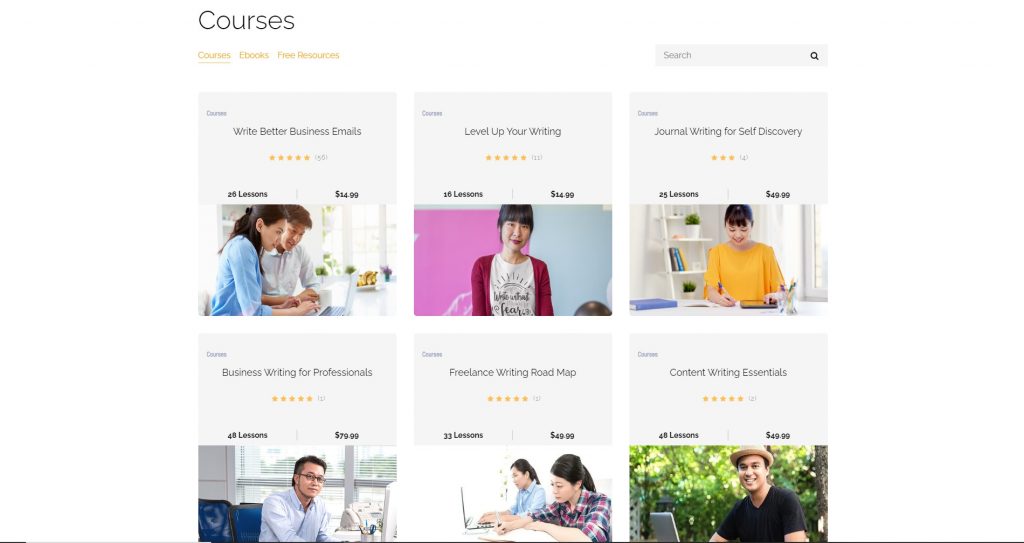Writing is a powerful tool – knowing how to write better is a superpower.
If you’re planning to make writing a long-term career, you need to keep experimenting, exploring, and growing. Even when you have achieved your writing or career goal, you shouldn’t be complacent. Like what the famous saying is, “There’s always room for improvement.”
WHAT DOES BEING A “BETTER WRITER” MEAN?
Becoming a better writer goes beyond improving the quality of your written work. It also includes revamping your writing process and determining your purpose.
These three go hand-in-hand. Establishing an effective writing process, will improve your output’s quality. Having a clear writing purpose, will make planning easier.
HOW TO BECOME A BETTER WRITER
1. Set a time and place to write.

“Make writing a habit.”
You might have heard of this advice multiple times already. But to make it work, you must consider creating a writing schedule and finding a perfect spot. Only then could you establish the habit of writing daily.
Why is it essential to include writing in your schedule? Because you can only fully commit to something if you’re willing to make time for it. Putting writing on your to-do-list and calendar will also help you remember it.
Here are the things you need to consider when creating your schedule:
- Energy. What time of the day are you the most productive? This is not the same for everyone. If you don’t know the answer to this question, feel free to explore different times of the day.
- Goal. How many words per day would you want to write? If you’re a beginner in writing, aim writing 200 to 300 words per day only. Don’t try to set a gigantic goal. Base it on your writing ability, but add a little challenge.
- Time. How many hours would it take to achieve your goal? Be realistic when you answer this question.
After that, decide on your writing place. To maximize your time, you need to enter the “state of flow.” Our mind is in this state when we can fully concentrate and immerse ourselves in what we’re doing.
One of the biggest hindrances to attain this state is distractions. As you know, distraction is a writer’s enemy. It snatches our chance to be productive and encourages us to procrastinate. That’s why it’s crucial to create a space that’s only for writing and nothing else.
Before you decide your writing space, consider the following:
- Clean. Find a workspace with little to no mess. An untidy desk will distract you and might also cause stress.
- Lighting. Work somewhere with good lighting.
- Surrounding. Stay away from your bed and from anything that will distract you from writing.
2. Write faster.
Writing faster doesn’t only refer to your typing speed. It is also about becoming more efficient and learning how to maximize your time to get more clients or spend more time doing things you love.
Here are some ways to write faster:
Do not edit while you write.
It is something that you need to learn and practice. I know it’s tempting to change a word whenever a blue zigzag line appears or when you feel like the sentence you just typed doesn’t seem to resonate with what you have in mind—but editing while writing slows down your writing process. You will have the chance to edit your work as much as you want, but you have to finish writing it first.

Use writing templates.
If you’ve had already written a proposal six months ago and need to make another one for a new client, you don’t need to start from scratch. Whether they are different projects, you can still use what you have as a guide. There’s also a big chance that the format and some of the proposal’s content are recyclable. Remember to keep templates for contracts, writing pitch, and a letter of introduction.
Outline your work.
Having an outline will help you focus on your writing topic and avoid creating unnecessary content. It can also help you arrange your ideas in a structured manner and help you with the flow. Without an outline, it will be easy to get side-tracked, and you’re going to have a hard time editing your work.
3. Be an avid reader.

“If you don’t have time to read, you don’t have the time (or the tools) to write.”
– Stephen King
Knowledge is one of the most significant investments you can make for yourself.
To be a great writer, you need to feed yourself with great ideas continuously. Successful authors and people like Bill Gates, Warren Buffet, and Oprah, are voracious readers.
Read books that will help you hone and deepen your knowledge of your niche or craft. If you’re into creative writing, then novels and other non-fiction may be excellent sources of inspiration for you. But if you’re writing about finance, instead of reading novels, you will benefit more from reading about cryptocurrency, trading, etc.
There’s nothing terrible about reading novels from time to time, but you should know your priorities. If you’re not in the mood to read something about your niche, try reading books to help you become better at writing instead.
Check this list out:
- The Elements of Style by William Strunk Jr.
- You are a Writer by Jeff Goins.
- The Artists’ Way by Julia Cameron.
For more tips, download our free eBook, “Write: A Frustrated Writer’s Guide to Finding Inspiration.”
4. Enroll in writing courses.

Many online courses can teach you how to improve your writing skills and others that will complement your expertise. Check out some of our writing courses and training if you’re looking for somewhere to start. We got lessons about business writing, freelance writing, improving your writing skills, and more.
There are also many free lessons on the internet about writing, so take advantage of them.
Pros of enrolling in writing courses:
- You could learn many new techniques and tools.
- Many online courses offer access to an exclusive Facebook community where you can connect and ask questions.
- Most also give an e-certificate that you can add to your social media and portfolio to boost your profile.
5. Be intentional when writing.
Intentional writing is writing with purpose and creating something with value. To stand out from other writers, you must provide something that will help your readers.
Check forums like Reddit and Quora and research the common questions or problems your audience has and write about that. Don’t just write for the sake of writing, but establish a purpose and make it meaningful.
Becoming an intentional writer doesn’t only focus on other people, but it can also be writing about something beneficial for you.
Another way to practice intentional writing is to discuss something you’re passionate about. When you like a particular topic, it’s easier to focus and deliver the best output because you enjoy what you’re doing.
Here are some questions to ask yourself before you write about something:
- What kind of emotions do I want my audience to feel?
- What do I want them to learn?
- What topic can I write about that my audience can relate to?
- What important information can I share?
- How can I share my story/experience in a way that will help my audience?
6. Ask for feedback.

You won’t notice some flaws in your written work, no matter how much you edit or review it. That’s why asking for feedback from other people is essential.
Before you start asking for feedback, you must first change your perception of it. Although it’s nice only to receive positive comments, it’s not attainable and healthy. In order to grow as a writer, you need to appreciate negative ones, too. Some flaws are only visible when other people point them out.
Getting negative opinions doesn’t mean you’re a failure. Don’t take it personally.
In case you don’t feel comfortable asking someone you know and you’re scared of what they’re going to say, find a community or online group instead.
7. Find a writing mentor.

Having a writing mentor will play a massive role in improving your skills and learning new techniques in becoming a better writer.
Mentors can help you develop your writing style and find your voice. If you’re also looking for someone to give you honest and expert feedback, they can provide that.
Here are some other benefits of having a mentor:
- Accountability. It’s easy to make excuses if we are too lazy to write, and no one holds us accountable for our actions. When you have a mentor, you will feel obliged to write because you know that someone will be disappointed with you once you fail to do so.
- Support. A great mentor will guide and support you on your career path. He/She is genuinely concerned about your writing journey and is willing to give that extra push when you need it.
- Inspire. Since your mentor is an experienced writer, he/she can relate to what you’re going through. Mentors can give you some advice and motivate you to keep moving whenever you feel like giving up.
- Find a mentor that is suitable for you and have the same values as you.
8. Avoid using unnecessary words or phrases.
Brevity is the NO. 1 principle of effective writing according to F.L Lucas.
A study conducted by Microsoft in 2015 found out that humans have a shorter attention span than goldfish. From 12 seconds in 2000, we are down to an average of 8 seconds.
Very few people will read your article word by word, so stuffing it with too many phrases won’t help. Trim your paragraphs as much as possible without affecting or sacrificing their quality.
Use apps like Hemingway, which is a free online editor.
Here are some other points you need to remember when writing:
- Avoid using the word “very”. Enhance your vocabulary and use powerful words.
- Eliminate sentence fillers. You don’t need to include “em,” “actually,” “basically,” “I mean,” and other fillers that you commonly use when speaking. (note: not unless you’re writing a novel and it’s something important for the story)
- Keep it concise and straightforward.
- Your paragraphs should only contain a maximum of 3-5 sentences.
- Don’t use complex words. This might feel contrary to #1, but you can still use strong words that won’t require your audience a dictionary before they can understand what you’re saying.
9. Keep an idea bank.

An idea bank is a perfect place to store and compile all your ideas and a must-have for writers. Having one will save you from writer’s block and from losing brilliant ideas that your mind can’t remember. Imagine it as an actual bank, but instead of getting money, you withdraw your thoughts. Isn’t it cool?
As writers, we all have our seasons. Sometimes, we have so many thoughts that we feel overwhelmed, but there are also times when all we can do is stare at a blank page. We need to squeeze out all of the ideas that we have while we still can.
Your idea bank can be:
- A pocket-size notebook.
- A piece of paper (make sure that you keep it)
- Mobile applications like Evernote or Notes.
After collecting and compiling, you’ll need to learn how to organize your ideas to connect and create valuable content for your readers.
10. Find your writing style.
One of the best ways to improve your skills and stand out is to develop your writing style. Your writing style is the distinct way of how you communicate with your audience. The two most essential elements that define it are your writer’s voice and your writing tone.
How can you find your style?
Most writers can’t identify it right away, and you might need to do some trial and error and see which style fits you the best. But here are some ways that will help you find it:
- Observe other authors. I’m pretty sure that there are some authors that you admire or some written works that you really enjoyed. Instead of just reading, try to look closely at the way they write and deliver. What kind of voice do they use? How about their writing tone? How do they approach their story?
- Experiment. Don’t just stick to what you’re comfortable with. Find and try other ways that will give you the chance to discover more things. If you’re currently writing blogs, articles, etc., then maybe you can explore creative writing!
- Be authentic. Although you can get ideas from other writers, in the end, the only way to be unique is to be you. Always remember this when writing.
11. Write like you’re talking.
Your goal is to create a genuine connection with your audience, and you won’t achieve that if you’re writing like a robot. Instead of writing so stiffly or formally, try to make it conversational.
Try to imagine that you’re speaking in front of your readers instead of thinking that you’re writing. Here are some ways to do that:
- Use short sentences. Unless you’re writing an academic paper, aim to write simply. This will improve readability, and you’ll be able to highlight the main point right away. Consider the average attention span and the ideal number of words in a sentence, which is 15-20 words.
- Sometimes, it’s okay to break the rules. Before doing this, you first need to understand the basic grammar rules, so you’ll know when it’s okay to break them.
- Ask your audience some questions. When you’re conversing in real-life, you don’t just keep talking. Right? You also engage the listeners by asking questions. Apply this practice in writing as well. It might help you get some engagements in the comment section of your blog or your social media post.
- Add some humor. It can help you captivate your readers’ attention, but you still need to be careful as some jokes might be offensive to others. Try to read your readers first and insert some mild humor as a starter.
- Share your story. One of the reasons we write is to give our audience something valuable or share something useful. But, from time-to-time, it’s also good to share your experience or say something about yourself that your audience might relate to.
12. Edit, edit, edit.

The first draft is black and white. Editing gives the story color.
Emma Hill
This is one of the most crucial tips you need to follow if you want to become a better writer. Editing is a tedious and challenging task, yet vital. Many writers spend more time editing, revising, and proofreading their work than the writing process.
Before publishing your work, you need to make sure that you spend enough time editing it. If you hate doing this, you can outsource instead.
But if you’re looking for ways to self-edit effectively, here are some tips to follow:
- Do not edit right after you finish writing. Leave your work for a couple of hours, or if you have more time, leave it for a day. It’s better to edit your work with fresh eyes and mind.
- Read your work aloud. When you can hear the words and sentences you’ve written, it’s easier to point out parts that don’t sound good.
- Re-read. After your first edit, rest for a while, then come back.
- Edit it once more. This time, look closely at your written work. Try to edit each line carefully.
- Use online tools. Invest in apps that will help you lessen your work. Check out Grammarly.
13. Publish your work.
Although it’s scary to imagine people posting nasty comments about your work, it doesn’t happen often. So, don’t stress yourself too much about it.
Instead of worrying, remember this: There are people out there who appreciate your written work. They are waiting for you to show what you’ve created, and they can’t wait to read more.
Receiving good comments, which will undoubtedly happen, can help boost your confidence. And just knowing that your written work is helping someone will be a great motivation to continue writing.
Also, consistently publishing your work can help improve your discipline. For example, you promised your readers that you’d post an article once a week. This commitment will push you to write whether you like it or not.
CONCLUSION
If you want to become a great writer, you must be willing to work on it. Many writers can claim that they want to be better, but only a few are taking action. If you want to join the latter group, start doing something from the list above now.
Let’s have a quick recap on how to become a better writer.
- Set a time and place to write. Include writing in your daily routine. Treat it as part of your work and not a hobby.
- Write faster. Find out how you can deliver your written output more quickly without sacrificing its quality.
- Be an avid reader. Before saying anything about a topic, you need to have enough knowledge first.
- Enroll in writing courses. Never stop learning.
- Be intentional when writing. Know your purpose when writing. Listen to your audience as well.
- Ask for Feedback. Having an idea of what other people think about your writing will help you determine what you need to improve.
- Find a writing mentor. Your mentor will hold you accountable, give your emotional support, and inspire you to keep moving.
- Avoid unnecessary words or phrases. Keep your writing simple and sweet.
- Keep an idea bank. This can save you from writer’s block.
- Find your writing style. Be unique and stand out from the crowd.
- Write as if you’re talking. Be casual with your audience.
- Edit, edit, edit. Spend more time editing than drafting.
- Publish your work. Show your writing skills to the world and be proud!
I hope you’re able to get something valuable from this post.
RECOMMENDED COURSE

Share with us your favorite tip below!
SOURCES
34 of the best books on WRITING: These will inspire you to write. (2021, January 26). Retrieved March 31, 2021, from https://thewritelife.com/best-books-on-writing/
Carter, S. (2012, March 14). Why mess causes stress: 8 reasons, 8 remedies. Retrieved March 31, 2021, from https://www.psychologytoday.com/us/blog/high-octane-women/201203/why-mess-causes-stress-8-reasons-8-remedies
Levin, M. (2017, August 13). Reading habits of the most successful leaders that can change your life too. Retrieved March 31, 2021, from https://www.inc.com/marissa-levin/reading-habits-of-the-most-successful-leaders-that.html
MasterClass. (2020, November 08). How to find and choose a writing mentor – 2021. Retrieved March 31, 2021, from https://www.masterclass.com/articles/how-to-find-and-choose-a-writing-mentor#what-is-a-writing-mentor
McSpadden, K. (2015, May 14). Science: You now have a shorter attention span than a goldfish. Retrieved March 31, 2021, from https://time.com/3858309/attention-spans-goldfish/
Jonah helps freelancers and entrepreneurs promote their personal brand or business by teaching writing and content marketing principles. During a casual day off, she enjoys painting, shopping for home decors, watching Netflix, or hosting meetups with friends.

